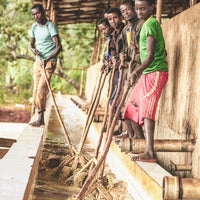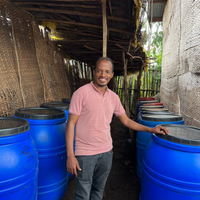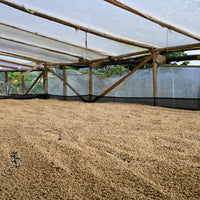El Salvador El Manzanal
Origin: El Salvador
Region: Apaneca-Ilamatepec
Altitude: 1200 meters above sea level
Farm: Finca El Manzanal
Owner: Jose Enrique Gutierrez
Variety: San Pacho
Process: Anaerobic Natural
Tasting Notes: Juicy and clean with notes of milk chocolate, orange and cherries.
Jose Enrique Gutierrez named his farm Finca El Manzanal after the tree that abounds on the plot. The manzanos tree provides shade for coffee trees and acts as a wind shield, especially during flowering when flowers must remain on the tree in order for cherry to grow.
In 2010, Jose Enrique adopted regenerative agriculture practices. He owns a cluster of farms in the Ahuachapan municipality. His family produced coffee in the eastern region of El Salvador but left due to low coffee prices and a civil war in the 1980s. Nevertheless, coffee is Jose Enrique’s passion and, when he purchased his first farm in 2007, he did so with a specialty mindset.
Jose Enrique mixes traditional agronomic knowledge with his own ideas for more sustainable practices. The specialty industry provided a stable price that, with his quality production, enabled him to increase his land and purchase additional farms. Today, all of his farms, including El Manzanal, San Jose, El Limo, Las Brisas, El Horno and Los Cocos are focused on specialty production.
This lot is composed of Orange San Pacho. San Pacho is a dwarf variety from Colombia. The name comes from the Spanish word “pacho” meaning “shallow”. Most San Pacho is red in color but the plants at Jose’s neighboring farm, El Limo, had an orange hue. Intrigued by the color change, Jose propagated those trees and planted them at Finca El Manzanal. One of the main features of San Pacho is its high productivity, especially for such a small tree. The same team picks this cherry ever year. They had to learn how to tell ripe and unripe cherry apart, since the color difference is less obvious with the orange-colored cherry. However, after a lot of hard work, they’re experts at picking only ripe cherry.
A dedicated team of trained pickers selectively handpick ripe cherry and deliver it to the on-site wet mill. Cherry is placed in biodegradable bags and sealed to ferment anaerobically for 120 hours. Following fermentation, cherry is laid on raised beds to dry. Cherry is raked frequently to ensure even drying. It takes approximately 28 to 31 days for cherry to dry.
Don’t be fooled by El Salvador’s small size. It was once the 4th largest coffee producer worldwide and continues to produce high quality lots. The country is known for its great cupping varieties, such as Bourbon and Pacamara. In fact, two beloved, frequently high-scoring varieties—Pacas and Pacamara— originated in El Salvador.
Unlike other countries, where specialty coffee production has required a great deal of additional investment and training, El Salvador already has a broad and skilled specialty coffee workforce. Farming traditions run deep, and many Salvadorian farmers are extremely passionate about coffee production and continuously strive to improve their crop. El Salvador has optimal conditions for coffee processing. The prolonged dry season typically occurs during the harvest season, making it easier to sun dry coffee.
Though coffee output in the country has been declining for over two decades – exacerbated by the Coffee Leaf Rust crisis, the approach to coffee production has changed from volume, to quality-driven. A new generation of coffee producers has sprouted around the country with a new vision and approach to production. Many of this generation are experimenting with processing and varietals.







